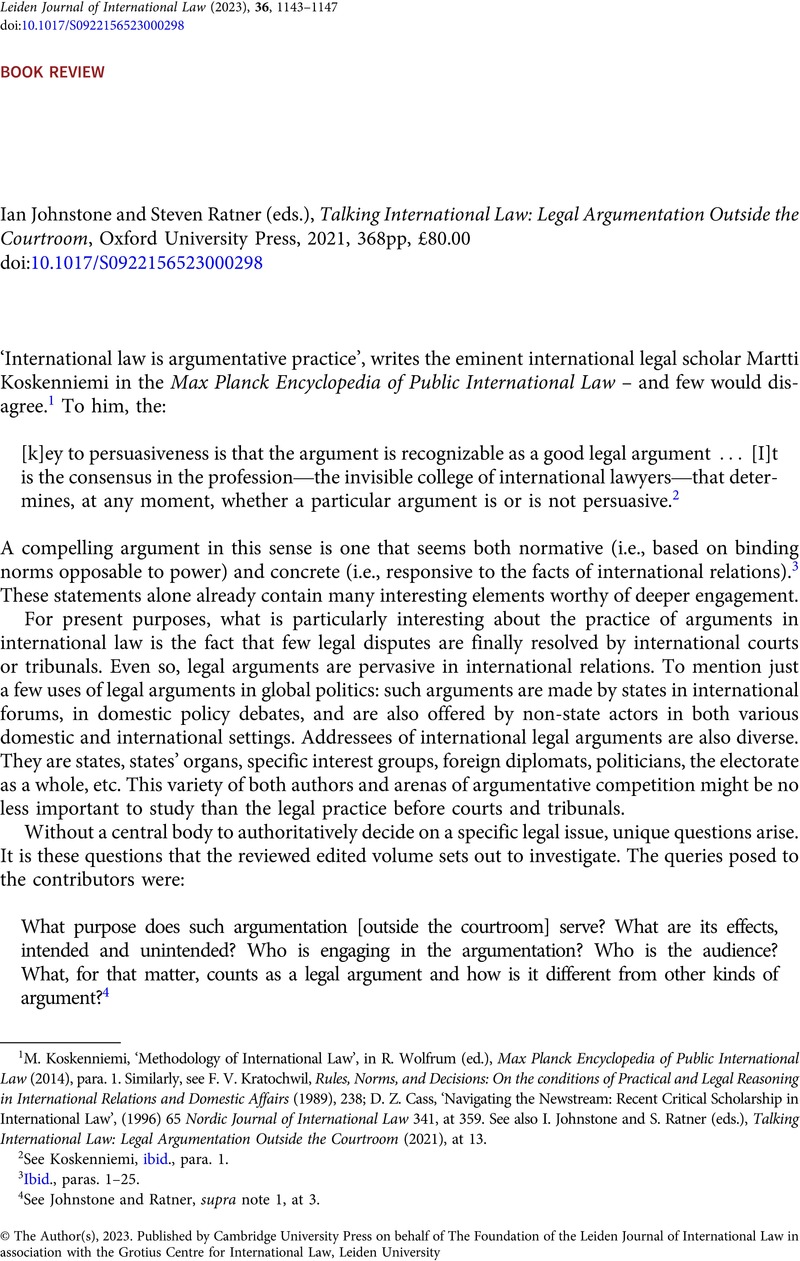No CrossRef data available.
Published online by Cambridge University Press: 08 May 2023

1 M. Koskenniemi, ‘Methodology of International Law’, in R. Wolfrum (ed.), Max Planck Encyclopedia of Public International Law (2014), para. 1. Similarly, see F. V. Kratochwil, Rules, Norms, and Decisions: On the conditions of Practical and Legal Reasoning in International Relations and Domestic Affairs (1989), 238; D. Z. Cass, ‘Navigating the Newstream: Recent Critical Scholarship in International Law’, (1996) 65 Nordic Journal of International Law 341, at 359. See also I. Johnstone and S. Ratner (eds.), Talking International Law: Legal Argumentation Outside the Courtroom (2021), at 13.
2 See Koskenniemi, ibid., para. 1.
3 Ibid., paras. 1–25.
4 See Johnstone and Ratner, supra note 1, at 3.
5 Ibid.
6 Ibid.
7 Ibid., at 339.
8 Ibid., at 342–3.
9 Ibid., at 344.
10 Ibid., at 347–8.
11 Ibid., at 351.
12 According to Scott Brewer, an argument ‘is comprised of two sets of propositions that stand in a particular dyadic relation. One set is called premises. The other set is called conclusions’: See S. Brewer, ‘Interactive Virtue and Vice in Systems of Arguments: A Logocratic Analysis’, (2020) 28(1) Artificial Intelligence and Law 151. I have adopted this definition in my study of logic and the analysis of legal arguments in international law: See G. M. Lentner, ‘Logic and the Analysis of Legal Arguments in Public International Law’, in D. Krimphove and G. M. Lentner (eds.), Law and Logic: Contemporary Issues (2017), 163.
13 See, e.g., Johnstone and Ratner, supra note 1, at 130, where Ian Johnstone ‘employs a narrow conception of legal argumentation—namely, an argument that explicitly invokes traditional sources of law, employs the standard techniques of interpretation, and seeks to determine whether behavior is consistent with the law’.
14 See ibid., at 16.
15 A. A. Leff, ‘Economic Analysis of Law: Some Realism About Nominalism’, (1974) 60 Virginia Law Review 451, at 466. Thanks to Scott Brewer for pointing this out to me and for his help in editing this review.
16 To paraphrase A. Roberts, Is International Law International? (2017).
17 See Johnstone and Ratner, supra note 1, at 64.
18 Ibid., at 66.
19 Ibid., at 177.
20 Ibid., at 47.
21 See B. Baade et al. (eds.), Cynical International Law?: Abuse and Circumvention in Public International and European Law (2021).
22 T. Aalberts and L. J. M. Boer, ‘Entering the Invisible College: Defeating Lawyers on Their Own Turf’, (2017) 87(1) British Yearbook of International Law 177.
23 A. Somek, Rechtliches Wissen (2006), 19–23.
24 See Roberts, supra note 16.
25 On the phenomenon of the production of ignorance in international law see, e.g., G. M. Lentner, ‘Law, Language, and Power: English and the Production of Ignorance in International Law’, (2019) 8 International Journal of Language & Law 50.
26 O. Ammann, ‘Language Bias in International Legal Scholarship: Symptoms, Explanations, Implications and Remedies’, (2022) 33(3) European Journal of International Law 821; Lentner, ibid.
27 H. Amborn, Law as Refuge of Anarchy. Societies Without Hegemony Or State (2019), 4.